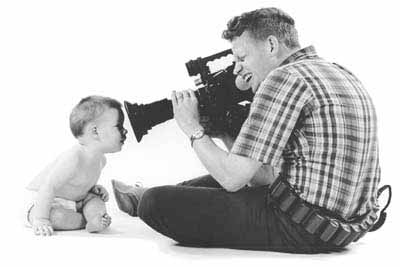 |


|

Top, Erik Daarstad shoots an event for the Sandpoint Centennial Film. (Photo by Bob Gunter)
|
Erik Daarstad
Feature Interview with Cinematographer
|

Daarstad while filming Childhood: The Enchanted Years in 1971.
(Photo courtesy of Erik Daarstad)
By Billie Jean Plaster
Sandpoint's Centennial Commission certainly had some good fortune when it came to hiring someone to make the Centennial Film. Erik Daarstad has been a professional cinematographer since the 1950s, specializing in documentaries. One of them, Why Man Creates, won an Academy Award for "Best Documentary" in 1968. A native of Norway, Daarstad moved to the United States in 1953 to study film at the University of Southern California. Upon graduating in 1957, he started climbing in his career and became a freelance cameraman, taking assignments all over the world. He and his wife, Louanne, decided on Sandpoint as an ideal place to raise their three children because of the ski area, lake and small-town lifestyle. They moved here in 1976 and then left in 1986 for Seattle where Daarstad worked in filming commercials. Four years ago, they moved back to Sandpoint for retirement.
This summer, Daarstad will turn 66, and he and Louanne will celebrate their 38th anniversary. He'll work on the Centennial Film all this year and into the next in preparation for its premier at the Panida Theater in the summer of 2002.
With two more film projects in Los Angeles and another pending in Butte, Mont., Daarstad's retirement is more and more becoming semi-retirement.
- Q. How did growing up in Norway under Nazi occupation affect you, your outlook on life and, ultimately, your work?
Basically, those times were hard for everyone there under German occupation. We lived in a small town in the mountains when the war started. Then my dad got killed in the war, so we ended up moving to where most of the family lived, a town called Sandes. I was 7 when my dad died in 1943. He was killed in a bombing attack. I was still fairly young, but I still remember a lot of it.
- Q. How did you get interested in a career in film?
When I went to high school, I liked still photography, and I also started enjoying movies. I went to a lot of movies, as many as two or three times a week. My last year of high school I decided, Well maybe that's something I want to try to do, to work as a cinematographer. The reason I came to the States was to try to find a way to get started in it, because Norway's pretty limited in terms of production. I just happened to listen to the radio one day, and I heard an interview with another young Norwegian who had gone to USC film school. Then basically, I wrote them, and applied and went over. I didn't know a soul there. I had relatives in this country, but not in the Los Angeles area.
- Q. Did you ever dream, when you came to study film in the U.S., that your career would take you to so many places and allow you to meet so many people?
I guess at the time I never thought about it. I just wanted to work in making movies. When I came here I wanted to work in the regular theatrical features. The way things ended up, I started working more in documentary films, which, of course, allowed me to do a lot of traveling and meet a lot of people in different situations.
- Q. Of all the films you've been involved in, what were the most interesting or stimulating for you personally, and why?
Just right out of college, I worked on a film (in 1959) with a bunch of us who went to USC called The Exiles that was about Native Americans living in Los Angeles. It was about a 90-minute film, and because it was a labor of love it stands out. It was the first, big long film I had worked on. There's other films like Why Man Creates, which won an Academy Award. ... The one about Adlai Stevenson ... He was the U.N. Ambassador at the time (in 1966). He ran for President against Eisenhower, twice in fact, and never won. A lot of the National Geographic shows and other shows of those types were very interesting because of the situations we got into. For example, the one we did in Africa called Kifaru -- The Black Rhinoceros ... because it was the first time I had been to East Africa ... and following that particular family. He was a Canadian biologist.
- Q. Have you had any scary experiences while filming?
That was probably the only one (Kifaru), and it happened so fast. He shot a dart into a black rhino, and it didn't go off ... didn't release the medicine. So we had to shoot him again with a tranquilizer gun, and this time it did go off and the animal went down. Then when he came up to it and pulled the first dart out, it went off, so the animal got double doses, which without antidote would kill it. So he started pouring antidote into the animal to save it. They were trying to get the animal on its feet. The first time it stumbled onto its feet, I was about 10 feet away, and it turned around and came right toward me. I turned around and started running. Because of the equipment we had at the time, I tripped on a cable and fell. The fortunate thing was that the rhino fell at the same time. That was probably the only time I had an experience that could have gone awfully wrong.
- Q. Who are some of the most famous or interesting people you've met?
[Some were the ones I met during a PBS series about filmmakers called Men Who Made the Movies] ... who were older filmmakers, like Hitchcock, Raoul Walsh and Howard Hawks, who made films in the '30s, '40s and '50s. They were fascinating people to meet and listen to their stories, because they were all people I admired.
- Q. How about some of the musicians?
I really enjoyed Creedence Clearwater because I liked their music, and it was at a time when they were just hitting it big. For Soul to Soul we took a whole payload of African-American musicians to Ghana, Africa and put on an 18-hour concert. Some of them were Roberta Flack, Ike and Tina Turner and Wilson Pickett.
- Q. How have you been able to maintain your family life with a career that has taken you away from home so much?
When you freelance like was my position, you don't work all the time. So you work for periods at a time. I always tried to keep the length of these periods down. When I finished a job, I could stay home for several weeks. It kind of made up for a lot. But it would be hard if you traveled constantly. I know a lot of people who in doing that, their marriages don't last too long.
The film industry doesn't seem to have a good record in that area.
No, they don't for various reasons. (laughs)
- Q. As a native Norwegian, how do you feel about lefse and lutefisk?
Oh, I've always enjoyed lefse, but I've always hated lutefisk. (laughs)
The Centennial Film will be released in the summer of 2002 in a special preview at the Panida Theater. Copies will be for sale. The Sandpoint Centennial Commission is accepting donations for the film.
|

|
|
|